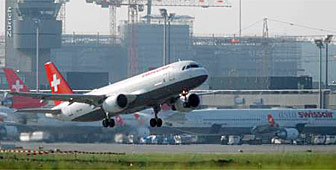Swissair sharply criticises aviation treaty

The Swissair Group says an agreement by Switzerland and Germany to reduce the number of flights over German territory is not workable, and does not correspond with international civil aviation agreements.
The transport ministers of Switzerland and Germany, Moritz Leuenberger and Kurt Bodewig, arrived at an agreement after prolonged discussions aimed at reducing noise from flights approaching Zurich’s international airport.
Negotiators had hoped that the agreement, announced by the two ministers following talks on Tuesday, would end the long-running dispute between the two countries over air traffic noise near the German town of Waldshut, which has prompted complaints by residents.
The ministers said a bilateral treaty covering the agreement will be signed later this month.
Swissair said the changes required by new regulations “will require costly changes to airline timetables and, in all likelihood, the cancellation of certain flights.”
Limit flight numbers
Earlier this year, the two sides had agreed to limit approaching flights over German territory to 100,000 by February 2005 – a reduction by a third compared with last year, when 154,000 approaching flights used the northern route.
According to Tuesday’s agreement the 100,000 limit will not be enforced before 2005, but Switzerland will “exploit every possibility to reduce flights over southern German territory” in the interim.
The compromise means that, in practice, Zurich airport must find alternative routes for the probable increase in flight movements between now and 2005.
Berlin had threatened to unilaterally limit the number of flights allowed over its territory to 80,000 per year, with that plan taking effect almost immediately if the talks failed.
The Swiss national carrier, Swissair, said it was “not satisfied” with the agreement which, it claimed, discriminated against the company which is the biggest user of Zurich airport.
The group said in a statement it objected to Tuesday’s deal because it sets limits on the number of flights rather than on the permitted level of noise.
“Swissair views its progressive fleet policy, that currently features the quietest aircraft, as being igorned while the company is being punished by being dictated various limits,” it said.
A spokesman for the International Air Transport Association, William Gaillard, said the treaty will be harmful for the Zurich airport, because of the new restrictions.
Zurich airport also expressed its disapproval of the accord, but said it was satisfied that Leuenberger had “stood firm” and did not cave in to demands for diminshed flights during the interim period.
The director of the Swiss Federal Office for Civil Aviation, André Auer, told the Solothurn newspaper that the agreement will not prevent the Kloten airport from carrying out its role as an aviation hub.
Settling compensation issue
Two other points on which Switzerland and Germany had disagreed at their last meeting in August have to do with Swiss compensation payments for residents in the German approach zone and whether the proposed treaty may prejudice Switzerland’s rights in the framework of a future bilateral agreement with the EU.
Berlin and Bern have now agreed that Swiss law shall apply in disputes over compensation. It was also agreed that the Swiss-German treaty should not jeopardise any benefits either side may obtain from a civil aviation treaty between Switzerland and the EU.
In a bilateral agreement with the EU signed in 1999 but not yet ratified by Brussels, Swiss airlines were promised full market access throughout Europe on a par with their EU competitors.
While the agreement does not cover the issue of approaching flights, attempts by the EU commission to create an all-European air space probably would cover it. It is likely that Switzerland would want to join a future EU operated air space agency.
According to many observers in Switzerland, few issues have brought home to the Swiss their international isolation as a nation in the centre of Europe but outside the EU as has the dispute with Germany. The proposed Swiss-German treaty was “not compatible with EU law”, a legal expert, Philipp Zurkinden, recently wrote in the influential weekly “Finanz und Wirtschaft”.
Role of geography
Others point out, however, that geography lies at the heart of the long-running dispute. Zurich’s international airport is unique in ranking within the top 10 of Europe’s airports, but it is located only 20 kilometres from an international border – the Swiss-German line along the Rhine river.
After Tuesday’s agreement, Swiss transport minister Leuenberger will probably find it easier to persuade parliament to ratify the Swiss-German treaty when it comes to a vote next year. Following Berlin’s recent demands, right-wing parties had threatened to vote against ratification.
The tentative agreement struck in April had led to ayllegations of a “sell-out” by Zurich airport officials and some media. Alternative southern approach routes have been proven to be technically possible, but are vehemently opposed by residents’ groups in the city of Zurich, which lies to the south of the airport.
Legal experts disagree on whether Germany has the right to treat approach flights to the airport of a neighbouring country in a particular manner.
Unique airport officials have called the treatment “discriminatory”, thus flauting EU law and other multilateral agreements covering civil aviation issues. The Swiss government on the other hand maintains that discrimination doesn’t come into the dispute, as not only Swissair flights or other Swiss airlines are subjected to the limitations, but all flights destined for Zurich.
In addition, international “rights” couldn’t be invoked as long as there was an alternative to the northern approach route, Swiss transport minister Leuenberger has repeatedly said. As a result, there was no alternative but to accommodate German wishes in a bilateral treaty.

In compliance with the JTI standards
More: SWI swissinfo.ch certified by the Journalism Trust Initiative
You can find an overview of ongoing debates with our journalists here. Please join us!
If you want to start a conversation about a topic raised in this article or want to report factual errors, email us at english@swissinfo.ch.